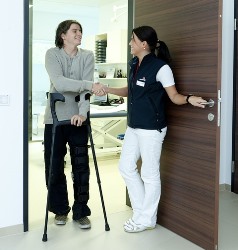How to Select the Best LVN or LPN Course Near Allentown Pennsylvania
 Now that you have decided on a fulfilling career in the field of nursing, it's imperative that you select a Licensed Practical Nurse (LPN) program near Allentown PA that will provide the proper training. If you live in Texas or California, then you will be searching for a Licensed Vocational Nurse (LVN) school instead. There is no distinction, other than the names, between an LPN and an LVN. They both undertake the same job functions and work in healthcare facilities under the supervision of Registered Nurses (RN) or Doctors. However their responsibilities do vary depending on the state they practice in, which we will look at in the next section. When starting their search for schools, many potential nursing students begin with the ones that are the nearest to their residences or that are the least expensive. Even though tuition and location are important factors, they are not the only criteria that you should base your selection on. Other concerns, such as if the schools are accredited or have high pass rates on the licensing exam are extremely important too. There are even more questions that you should ask potential schools before enrolling in a LPN or LVN program that we will cover later in this article. But first, let's have a look at the role of an LPN and what is involved in the training and licensing process.
Now that you have decided on a fulfilling career in the field of nursing, it's imperative that you select a Licensed Practical Nurse (LPN) program near Allentown PA that will provide the proper training. If you live in Texas or California, then you will be searching for a Licensed Vocational Nurse (LVN) school instead. There is no distinction, other than the names, between an LPN and an LVN. They both undertake the same job functions and work in healthcare facilities under the supervision of Registered Nurses (RN) or Doctors. However their responsibilities do vary depending on the state they practice in, which we will look at in the next section. When starting their search for schools, many potential nursing students begin with the ones that are the nearest to their residences or that are the least expensive. Even though tuition and location are important factors, they are not the only criteria that you should base your selection on. Other concerns, such as if the schools are accredited or have high pass rates on the licensing exam are extremely important too. There are even more questions that you should ask potential schools before enrolling in a LPN or LVN program that we will cover later in this article. But first, let's have a look at the role of an LPN and what is involved in the training and licensing process.
It Only Takes a Few Minutes to Start Your LPN or LVN Career Below
Job Duties of an LPN or LVN

A licensed practical nurse cares for the basic medical needs of a patient by monitoring their blood pressure and other vital signs and providing the person with the necessities of basic comforts like bathing or other needs. LPNs work in a variety of health care systems. Settings can range from Allentown PA clinics, hospitals, nursing homes, rehabilitation centers, extended care facilities, clinics, and even private practices. Depending on each state’s regulations, LPNs may be involved in medical care such as inserting catheters, intravenous drips (IVs), assisting to deliver babies, or giving approved medication. They would be responsible for keeping accurate records of a patient such as their history, diagnosis, progress, and any new medical problem that may occur and inform the doctor or registered nurse. He or she is overseen by a doctor or registered nurse. Many facilities require work hours to exceed the normal 8-hour shifts. Therefore, according to the National Federation of Licensed Practical Nurses, it’s necessary to have physical strength and stamina due to the direct care to patients you will provide. An LPN should be compassionate, patient in difficult situations, and have interpersonal skills. They should have the ability to communicate clearly and be an attentive listener.
LVN and LPN Courses
A licensed practical nurse is required to complete an approved educational program that normally takes 1 year in order to obtain a diploma or certificate. Programs are available in community colleges and trade schools. Every program provides supervised clinical experience. After receiving a diploma or certificate, an LPN takes the National Council Licensure Examination (NCLEX-PN) in order to get licensed to work. The exam is five hours long. It’s important to make sure that the program you enroll in is accredited, which ensures the high quality standard of the program However, the program must be officially recognized by the State Board of Nursing or you cannot register to take the NCLEX-PN exam and will be unable to get licensed. Though all nationally accredited schools will also be approved by their state, it’s possible for a school to be approved but not accredited. LPNs can also take advanced programs available through professional associations in specialized areas. According to the National Federation of Licensed Practical Nurses, LPNs can be trained in medication treatment, specialized procedures, or critical care interventions. By the way, working as an LPN can also pave the way to becoming a registered nurse (RN). Many schools offer what’s called a ‘bridge’ program. These programs take into account your LPN schooling and work experience and make it easier to transition to become an RN.Enrolling in LVN and LPN Classes Online
 Attending LPN programs online is growing into a more popular way to get training and earn a nursing certificate or degree in Allentown PA. Some schools will require attending on campus for part of the training, and virtually all programs require a certain amount of clinical rotation hours performed in a local healthcare facility. But since the remainder of the training can be accessed online, this alternative may be a more practical answer to finding the time to attend school for some students. Regarding tuition, some online degree programs are less expensive than other on campus choices. Even additional expenses such as for commuting and study materials can be lessened, helping to make education more affordable. And many online programs are accredited by U.S. Department of Education recognized organizations. And so if your work and household responsibilities have left you with little time to work toward your academic goals, maybe an online LPN training program will make it easier to fit a degree into your busy schedule.
Attending LPN programs online is growing into a more popular way to get training and earn a nursing certificate or degree in Allentown PA. Some schools will require attending on campus for part of the training, and virtually all programs require a certain amount of clinical rotation hours performed in a local healthcare facility. But since the remainder of the training can be accessed online, this alternative may be a more practical answer to finding the time to attend school for some students. Regarding tuition, some online degree programs are less expensive than other on campus choices. Even additional expenses such as for commuting and study materials can be lessened, helping to make education more affordable. And many online programs are accredited by U.S. Department of Education recognized organizations. And so if your work and household responsibilities have left you with little time to work toward your academic goals, maybe an online LPN training program will make it easier to fit a degree into your busy schedule.
Things to Ask LPN and LVN Schools
Once you have decided on obtaining your LPN certificate, as well as if you will attend classes on campus or online, you can use the following guidelines to start narrowing down your options. As you undoubtedly are aware, there are numerous nursing schools and colleges near Allentown Pa as well as within Pennsylvania and throughout the United States. So it is essential to reduce the number of schools to select from in order that you will have a manageable list. As we earlier pointed out, the location of the school and the cost of tuition are most likely going to be the primary two factors that you will take into consideration. But as we also stressed, they should not be your only qualifiers. So prior to making your final decision, use the following questions to see how your selection compares to the other schools.
- Accreditation. It's a good idea to make sure that the certificate program as well as the school are accredited by a U.S. Department of Education recognized accrediting organization. Aside from helping verify that you get an excellent education, it may assist in obtaining financial aid or student loans, which are often not offered for non-accredited schools near Allentown Pennsylvania.
- Reputation. Check online rating services to see what the assessments are for each of the LPN schools you are considering. Ask the accrediting agencies for their reviews too. Also, check with the Pennsylvania school licensing authority to determine if there are any complaints or compliance issues. Finally, you can call some nearby Allentown PA healthcare organizations you're interested in working for after graduation and ask what their judgements are of the schools as well.
- Internship Programs. The most effective way to acquire experience as a Licensed Practical Nurse is to work in a clinical environment. Essentially all nursing degree programs require a certain number of clinical hours be completed. Various states have minimum clinical hour requirements for licensing as well. Check if the schools have a working relationship with nearby Allentown PA community hospitals, clinics or labs and assist with the placement of students in internships. Also, it's important that you choose a school that offers clinical training in the type of facility you are most interested in. For example, if you want training and experience in pediatric care, make sure that the school you choose provides adequate clinical rotation in an area Pediatric Hospital.
- Licensing Preparation. Licensing prerequisites for LPNs are different from state to state. In all states, a passing score is needed on the National Council Licensure Examination (NCLEX-PN) as well as graduation from an approved school. Certain states require a certain number of clinical hours be completed, as well as the passing of additional tests. It's imperative that the school you are attending not only provides an outstanding education, but also readies you to comply with the minimum licensing requirements for Pennsylvania or the state where you will be practicing.
- Graduation and Job Placement Rates. Find out from the LPN schools you are considering what their graduation rates are as well as how long on average it takes students to finish their programs. A low graduation rate may be an indication that students were unhappy with the program and dropped out. It's also important that the schools have high job placement rates. A high rate will not only substantiate that the school has a superb reputation within the Allentown PA healthcare community, but that it also has the network of relationships to help students attain employment.
- NCLEX Exam Pass Rate. Once you receive your certificate or diploma, you must sign up for and pass the National Council Licensure Examination for Practical Nurses (NCLEX-PN). Enrolling in a school with at least a 75% pass rate is highly preferred. Lower pass rates may indicate that a school’s program, curriculum or instructors are ineffective in teaching its students. You can find out from the school what their passing rate is for the last 5 years, or request the information from the State Board of Nursing.
More Info on How to Become an LPN or LVN in Allentown
Choose the Best Allentown Licensed Vocational Nurse Training
Enrolling in the ideal Licensed Practical Nurse program is probably the most important first step to beginning a new career in the medical care industry. There are numerous variables that you should take into account when choosing a nursing school. These variables will be prioritized differently contingent on your current career goals, lifestyle, and financial situation. As we have highlighted in this post, it is important that you choose an LPN college and a certificate or degree program that are both accredited and have outstanding reputations within the medical community. By utilizing our list of qualifying questions, you will be able to develop a shortlist of schools to pick from so that you can make your final selection. And with the appropriate degree and training, combined with your hard work and desire to succeed, you can become a Licensed Practical Nurse in Allentown Pennsylvania.
